I Wake Up Streaming: August 2020
Movies
In this edition of “I Wake Up Streaming,” novelist William Boyle rounds up his top streaming picks for the month of August. The column’s name is a play on the 1941 film I Wake Up Screaming, starring Betty Grable, Victor Mature, and Carole Landis. While the film’s title hits a pleasing note of terror and despair, changing that one letter speaks to the joy of discovering new films and rediscovering old favorites, as well as the panic that comes with being overwhelmed by options.
As I write this, it’s the first day of August—I learned yesterday that the British director Alan Parker passed away. Bugsy Malone was a favorite of mine as a kid and remains a film I delight in rewatching and showing to my own children. The Commitments, Birdy, Angel Heart, Shoot the Moon, Midnight Express, and Mississippi Burning were all instrumental in shaping my love of cinema. (I remember watching Fame when I was very young, though I’d be lying if I said it had a big impact on me.) In the ’90s, there were Parker’s ambitious adaptations of T.C. Boyle’s The Road to Wellville and Frank McCourt’s Angela’s Ashes, considered misfires at the time but both very interesting in their ways. In addition, there were, of course, two of his most well-known works, Pink Floyd: The Wall and Evita (I’ve somehow managed to never see either). I own a bunch of Parker’s films on DVD and Blu-ray, but I wanted to start by identifying which are available across various streaming services. On Prime, you’ll find Bugsy Malone (a good place to start), Birdy, Mississippi Burning, and Angela’s Ashes. On HBO Max, Shoot the Moon. To my great surprise, those are the only Parker films that are currently streaming, but this lack of availability speaks to his reputation as a great director who has somehow fallen through the cracks. It’s well worth investing your time in his filmography.
Next, I’m going to do something here that I aim not to do too much of: recommend a film I haven’t seen yet. Clark Duke’s directorial debut, Arkansas, will be available on Prime as of August 5. Starring Liam Hemsworth, Vince Vaughn, John Malkovich, and Vivica A. Fox, it’s an adaptation of a great novel by John Brandon. I’m holding out hope that it does the source material justice, which is why I’m mentioning it here. What I’m really doing, I guess, is heartily recommending the book and everything else of John Brandon’s you can get your hands on.
I’d also be remiss if I didn’t mention the latest season of the podcast You Must Remember This, which just concluded its ten-episode run on the life and career of Polly Platt. Platt has mostly been remembered for her collaborations with ex-husband Peter Bogdanovich on four classic films: Targets; The Last Picture Show; What’s Up, Doc?; and Paper Moon. Platt was the production and costume designer on those films and the cowriter of Targets, though she did much, much more, but it was Bogdanovich alone who took on the mantle of budding auteur. Really, it was Platt who was the auteur—that’s what host Karina Longworth’s investigation into her complex career reveals. Platt’s work behind the scenes on films by James L. Brooks, Cameron Crowe, and Wes Anderson is ample evidence of a genius who—because she was a woman—resigned herself to the shadows while powerful men hogged the spotlight. She ultimately has some incredible credits—as production designer, costume designer, screenwriter, and producer—but Platt’s lost filmography is staggering. It’s insane, given her level of success, that she was hindered at every turn when attempting to make her own films. Highly recommended listening. Most of the films Platt was involved with are widely available to rent and via physical media, though only a few are currently included on streaming platforms. An offbeat recommendation: 1979’s Good Luck, Miss Wyckoff, which Platt wrote the script for (adapted from a novel by William Inge), is streaming free on Tubi. It’s a deeply interesting and deeply disturbing film—one that serves as connective tissue between Douglas Sirk’s Technicolor ’50s melodramas and David Lynch’s journeys into the darkness under the surface of the American Dream.
Having focused goals as a viewer—revisiting a director’s filmography, for example—can lift the burden of choice. Apart from that, I know, it can be difficult to navigate the wide range of new stuff coming and going across the many available services. I’ve picked some of my other favorites below, aiming to highlight films and specials that are new or have fallen through the cracks.
Wild Rose. 2019. Hulu.
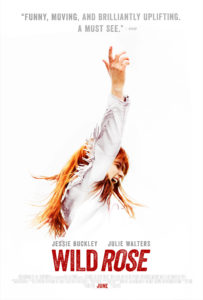
A great script by Nicole Taylor and very solid direction from Tom Harper provide reason enough to show up, but it’s Jessie Buckley’s lead performance as Rose-Lynn Harlan, a working-class Glaswegian who longs to be a country star in Nashville, that will stay with you long after you finish this one. It’s a miracle of a performance, at turns tender and heartbreaking, hard and funny. Buckley’s voice is a wonder, sure, but it’s astounding just how much emotion she can get across with a simple look. In twenty years, maybe ten or five, people will look back at 2019 and be shocked that she wasn’t even nominated at the Academy Awards or Golden Globes for this performance, that Renée Zellweger’s mediocre Judy Garland mimicry was instead celebrated. I don’t put too much stock in awards, but Buckley’s performance is on the same level as Rip Torn’s in Payday and Sissy Spacek’s in Coal Miner’s Daughter and should’ve garnered far more attention—it was my second favorite of 2019 after Elisabeth Moss in Her Smell. The film itself doesn’t hit the levels of Payday or Coal Miner’s Daughter or even Her Smell, but Buckley tries her damnedest to lift it to those heights. Another thing: Mary Steenburgen wrote the song that Buckley performs at the end of the film, “Glasgow (No Place Like Home).” If you don’t know the story behind that, well, it’s one for the books. Steenburgen, after minor arm surgery about ten years ago, woke up with a gift for music she didn’t previously possess. No shit. Look it up. Everything was music to her. Thoughts, conversation, street signs. She started writing songs and didn’t stop, signing a contract with Universal in Nashville. It was a long road, but she wound up writing the beautiful ballad that serves as Wild Rose’s coda.
Capone. 2020. Prime Video.
 Josh Trank’s Capone (available via Prime on August 10) won’t be for everyone, which makes me like it even more. It’s by no means a biopic, more of a fever dream told from the POV of an aging, dementia-ridden gangster. Think the last half-hour of Scorsese’s The Irishman with the gloves all the way off. Instead of a more by-the-numbers approach, Trank digs around in the guts of gangster-picture conventions. The result is a labyrinthine nightmare full of ghosts, flashes of violence from the past, and a consideration of the different ways that memory processes trauma that’s been both received and inflicted. Tom Hardy quacks his way through one of the great, understated batshit crazy performances in recent memory. His Al Capone is a mad, sorrowful cartoon monster.
Josh Trank’s Capone (available via Prime on August 10) won’t be for everyone, which makes me like it even more. It’s by no means a biopic, more of a fever dream told from the POV of an aging, dementia-ridden gangster. Think the last half-hour of Scorsese’s The Irishman with the gloves all the way off. Instead of a more by-the-numbers approach, Trank digs around in the guts of gangster-picture conventions. The result is a labyrinthine nightmare full of ghosts, flashes of violence from the past, and a consideration of the different ways that memory processes trauma that’s been both received and inflicted. Tom Hardy quacks his way through one of the great, understated batshit crazy performances in recent memory. His Al Capone is a mad, sorrowful cartoon monster.
Things to Come. 2016. Criterion Channel.
 Mia Hansen-Løve’s Things to Come was one of my favorite films of 2016. It’s part of a mini-retrospective on the Criterion Channel that also features Father of My Children and Goodbye First Love, two of her earlier films that I haven’t yet seen. In Things to Come, the great Isabelle Huppert plays Nathalie Chazeaux, a high school philosophy teacher who reinvents her life after her husband leaves her for another woman. It’s a moving masterpiece about grace and empathy from one of the most exciting young directors out there. Hansen-Løve’s next project, Bergman Island, is the film I’m most looking forward to in 2021—if there is a 2021!
Mia Hansen-Løve’s Things to Come was one of my favorite films of 2016. It’s part of a mini-retrospective on the Criterion Channel that also features Father of My Children and Goodbye First Love, two of her earlier films that I haven’t yet seen. In Things to Come, the great Isabelle Huppert plays Nathalie Chazeaux, a high school philosophy teacher who reinvents her life after her husband leaves her for another woman. It’s a moving masterpiece about grace and empathy from one of the most exciting young directors out there. Hansen-Løve’s next project, Bergman Island, is the film I’m most looking forward to in 2021—if there is a 2021!
Sun Don’t Shine. 2012. Criterion Channel.
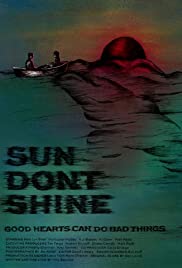 With Amy Seimetz’s new film, She Dies Tomorrow, hitting drive-ins and virtual cinemas in early August, it’s a perfect time to revisit her debut as a director, Sun Don’t Shine, which is being featured on the Criterion Channel this month. A hazy, atmospheric, sun-drenched Florida noir, it subverts the conventions of the typical lovers-on-the-run story. It shares something tonally in common with Lynne Ramsay’s masterpiece, Morvern Callar, but it’s also dosed with a healthy amount of American grit, feeling like a lost Vicki Hendricks novel. Kate Lyn Sheil is magnetic as Crystal. I’ve watched this film several times over the past eight years, and it keeps opening itself up to me, revealing more and more. I’m glad to see it finally getting the audience it deserves.
With Amy Seimetz’s new film, She Dies Tomorrow, hitting drive-ins and virtual cinemas in early August, it’s a perfect time to revisit her debut as a director, Sun Don’t Shine, which is being featured on the Criterion Channel this month. A hazy, atmospheric, sun-drenched Florida noir, it subverts the conventions of the typical lovers-on-the-run story. It shares something tonally in common with Lynne Ramsay’s masterpiece, Morvern Callar, but it’s also dosed with a healthy amount of American grit, feeling like a lost Vicki Hendricks novel. Kate Lyn Sheil is magnetic as Crystal. I’ve watched this film several times over the past eight years, and it keeps opening itself up to me, revealing more and more. I’m glad to see it finally getting the audience it deserves.
Three by Bill Gunn: The Angel Levine; Ganja & Hess; Personal Problems. 1970, 1973, 1980. Criterion Channel.
 Another Criterion Channel retrospective, this one dedicated to the incredible and underappreciated Bill Gunn. The Angel Levine is a Bernard Malamud adaptation cowritten by Gunn, directed by Ján Kadár, and starring Harry Belafonte and Zero Mostel. It’s a lovely fable. Ganja & Hess is Gunn’s Afrocentric acid vampire drama, a ’70s classic that’s unnerving and avant-garde, a reclamation of the vampire myth, a philosophical tone poem, an expressionistic masterpiece. Then there’s Personal Problems, Gunn’s “experimental soap opera,” an epic of microdramas shot on video that feels like documentary realism and centers on a Harlem nurse, her husband, her father-in-law, and her lover. Directed by Gunn and written by Ishmael Reed, it’s revelatory. The filmmaker Graham L. Carter says that it’s the closest thing to living a life he’s ever seen on screen. I agree totally.
Another Criterion Channel retrospective, this one dedicated to the incredible and underappreciated Bill Gunn. The Angel Levine is a Bernard Malamud adaptation cowritten by Gunn, directed by Ján Kadár, and starring Harry Belafonte and Zero Mostel. It’s a lovely fable. Ganja & Hess is Gunn’s Afrocentric acid vampire drama, a ’70s classic that’s unnerving and avant-garde, a reclamation of the vampire myth, a philosophical tone poem, an expressionistic masterpiece. Then there’s Personal Problems, Gunn’s “experimental soap opera,” an epic of microdramas shot on video that feels like documentary realism and centers on a Harlem nurse, her husband, her father-in-law, and her lover. Directed by Gunn and written by Ishmael Reed, it’s revelatory. The filmmaker Graham L. Carter says that it’s the closest thing to living a life he’s ever seen on screen. I agree totally.
Eddie Pepitone’s For the Masses and Maria Bamford’s Weakness Is the Brand. 2020. Prime Video.
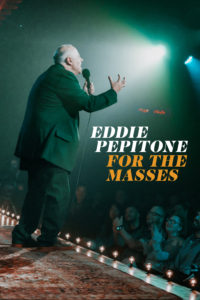 Two under-the-radar specials from two of my favorite living comedians. Pepitone has stretches of total genius in For the Masses and some moments that don’t work quite as well. In Weakness Is the Brand, Bamford is versatile and wild and unpredictable, the Roky Erickson or Daniel Johnston of the stand-up circuit, and she’s doing the best work of her career. Both specials gave me my hardest laughs of quarantine—maybe my only laughs. There’s one Bamford joke—I won’t ruin it—that’s so out of left field and so strange that I laughed until I cried and then I started coughing and the laughter kept coming and I just toppled over, thinking, Well, this would be an okay way to die. Anyhow, I should probably mention that I’ve recommended both of these comedians to many folks—their acts click for some and whiff for others. If you’re partial to a well-oiled stand-up comic—a stage-pacer, a rallier of crowds, a person totally at ease under the bright lights in front of a massive audience—I’d say Pepitone and Bamford are not for you. As Bamford says, “weakness is the brand” here. Fans of strange, electric, disorienting, disarming, sometimes alienating comedy should take heed, though.
Two under-the-radar specials from two of my favorite living comedians. Pepitone has stretches of total genius in For the Masses and some moments that don’t work quite as well. In Weakness Is the Brand, Bamford is versatile and wild and unpredictable, the Roky Erickson or Daniel Johnston of the stand-up circuit, and she’s doing the best work of her career. Both specials gave me my hardest laughs of quarantine—maybe my only laughs. There’s one Bamford joke—I won’t ruin it—that’s so out of left field and so strange that I laughed until I cried and then I started coughing and the laughter kept coming and I just toppled over, thinking, Well, this would be an okay way to die. Anyhow, I should probably mention that I’ve recommended both of these comedians to many folks—their acts click for some and whiff for others. If you’re partial to a well-oiled stand-up comic—a stage-pacer, a rallier of crowds, a person totally at ease under the bright lights in front of a massive audience—I’d say Pepitone and Bamford are not for you. As Bamford says, “weakness is the brand” here. Fans of strange, electric, disorienting, disarming, sometimes alienating comedy should take heed, though.
Starstruck. 1982. Criterion Channel.
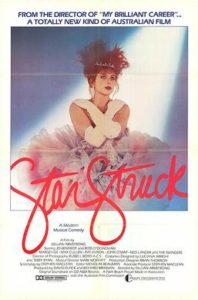 Gillian Armstrong’s second film, Starstruck, part of the Australian New Wave collection just added to the Criterion Channel, is a great joy. A musical coming-of-age story about a young woman who is pursuing her dream of singing. New wave and neon mixed with Busby Berkeley and West Side Story and maybe a dash of John Waters. Vibrant, fun, and raucous.
Gillian Armstrong’s second film, Starstruck, part of the Australian New Wave collection just added to the Criterion Channel, is a great joy. A musical coming-of-age story about a young woman who is pursuing her dream of singing. New wave and neon mixed with Busby Berkeley and West Side Story and maybe a dash of John Waters. Vibrant, fun, and raucous.
Super Deluxe. 2019. Netflix.
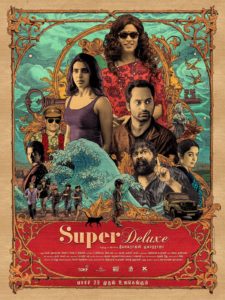 Thiagarajan Kumararaj’s Super Deluxe is really something else. A three-hour Indian Tamil-language film currently streaming on Netflix, it’s this sprawling, messy, strange riff on Pulp Fiction and Magnolia that’s loaded with gorgeous shots. I compare it with those films not because I think they invented a certain kind of ambitious multi-narrative storytelling but because the film itself seems like an homage to them specifically. It’s funny, dark, simultaneously problematic (regarding its portrayal of women, especially a key trans character) and full of compassion (for those very same characters), and one hundred percent bonkers. A week after watching it, I’m still processing what exactly I’ve seen. Kumararaj’s previous film, Aaranya Kaandam (2011), is an epic neo-noir that seems impossible to track down in America. In any case, he took eight years between films, and it’s like he threw everything he had into Super Deluxe—every crazy idea, every shot he’d wanted to use in all that time, every wild fantasy he was chasing. On a plot level, it feels a little undercooked and off-kilter at times, but it’s so visually arresting that it’s easy to look past the film’s faults. If it’s a mess, it’s an absolutely glorious one.
Thiagarajan Kumararaj’s Super Deluxe is really something else. A three-hour Indian Tamil-language film currently streaming on Netflix, it’s this sprawling, messy, strange riff on Pulp Fiction and Magnolia that’s loaded with gorgeous shots. I compare it with those films not because I think they invented a certain kind of ambitious multi-narrative storytelling but because the film itself seems like an homage to them specifically. It’s funny, dark, simultaneously problematic (regarding its portrayal of women, especially a key trans character) and full of compassion (for those very same characters), and one hundred percent bonkers. A week after watching it, I’m still processing what exactly I’ve seen. Kumararaj’s previous film, Aaranya Kaandam (2011), is an epic neo-noir that seems impossible to track down in America. In any case, he took eight years between films, and it’s like he threw everything he had into Super Deluxe—every crazy idea, every shot he’d wanted to use in all that time, every wild fantasy he was chasing. On a plot level, it feels a little undercooked and off-kilter at times, but it’s so visually arresting that it’s easy to look past the film’s faults. If it’s a mess, it’s an absolutely glorious one.
Disappearance at Clifton Hill. 2020. Hulu.
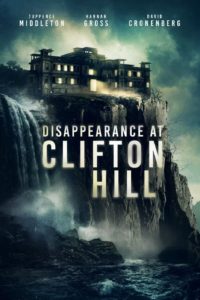 If you like stark little indie crime dramas, I recommend Albert Shin’s Disappearance at Clifton Hill. That said, if you’re big on resolution, it’ll probably be best to give this one a pass. Tuppence Middleton gives a compelling performance as Abby, who has returned home to Niagara Falls following the death of her mother to tend to the old tourist motel her family used to run. A local magnate is moving in, trying to buy the place out. Meanwhile, Abby remembers a kidnapping that she witnessed as a little girl, bringing her into the orbit of one of the town’s biggest power players (that very same magnate), a wacky magician couple, and a true crime podcaster and part-time salvage diver played by David Cronenberg. There’s the motel, but there are also dive bars, casinos, haunted houses, out-of-time diners, and VHS fetishism. It’s a little Veronica Mars–ish in a good way, but it also marches to its own beat, never succumbing to the traps of formula. It’s dark but not unbearably so, and there’s a decent streak of humor mixed in there too.
If you like stark little indie crime dramas, I recommend Albert Shin’s Disappearance at Clifton Hill. That said, if you’re big on resolution, it’ll probably be best to give this one a pass. Tuppence Middleton gives a compelling performance as Abby, who has returned home to Niagara Falls following the death of her mother to tend to the old tourist motel her family used to run. A local magnate is moving in, trying to buy the place out. Meanwhile, Abby remembers a kidnapping that she witnessed as a little girl, bringing her into the orbit of one of the town’s biggest power players (that very same magnate), a wacky magician couple, and a true crime podcaster and part-time salvage diver played by David Cronenberg. There’s the motel, but there are also dive bars, casinos, haunted houses, out-of-time diners, and VHS fetishism. It’s a little Veronica Mars–ish in a good way, but it also marches to its own beat, never succumbing to the traps of formula. It’s dark but not unbearably so, and there’s a decent streak of humor mixed in there too.
William Boyle is the author of the novels Gravesend, The Lonely Witness, A Friend Is a Gift You Give Yourself, and City of Margins, and a story collection, Death Don’t Have No Mercy. His novella Everything is Broken was published in Southwest Review Volume 104, numbers 1-4. His writing on film has appeared in Oxford American and CrimeReads. He used to have a blog about ’70s crime films called Goodbye Like a Bullet. His website is williammichaelboyle.com.
More Movies


